HIGH ASPIRATIONS, TRADITIONAL VALUES


HIGH ASPIRATIONS, TRADITIONAL VALUES

Choosing A-level subjects can feel like a daunting task and we have constructed this curriculum guide to give you an overview of what we offer at Holyport College. Each subject page is designed to give you some of the answers to the questions: Why should I study this subject? What are the associated degree courses at university? What potential career opportunities will this subject open up for me? Whilst we have attempted to address these questions, we cannot make decisions for you and, whilst we can advise, ultimately it is you, the student, who should be starting to take control of your own education and your own future. It is therefore important that you do your research to look at what subject combination is the right thing for you that will put you on a path to the degree course and/or career you wish to pursue. If you are not sure of what you want to do later in life, it’s not a problem, you won’t go far wrong choosing subjects that you are good at and enjoy.
If you apply to Holyport College, you will be invited to an academic interview in January where we will discuss your potential options, and further discussions and support in your decision making happen throughout the application process. We are here to support you every step of the way!
The table below shows some of the degree subjects where Mathematics and Further Mathematics are essential for entry. Information will differ, dependent on the University in question, but this gives a general overview.
If you study maths to degree level then almost any career is open to you. Employers know that you have a willingness to work hard and the ability to think logically and to solve problems. This list gives an idea of some of the areas in which employers often look.
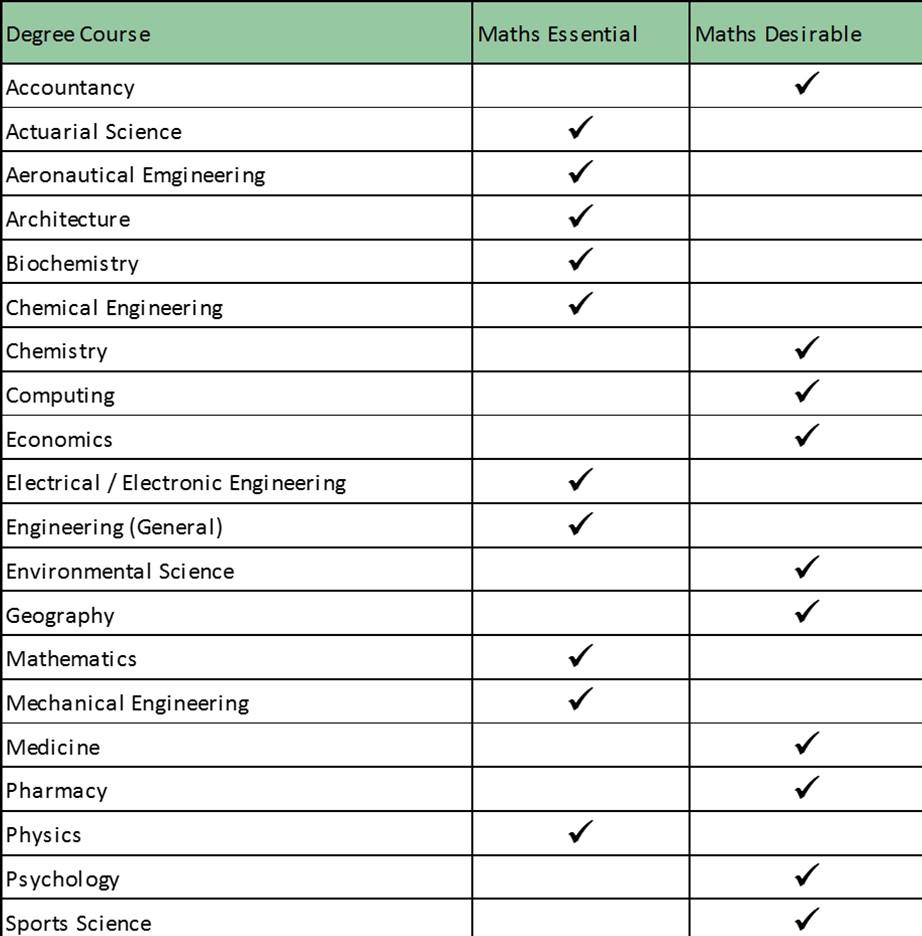
• Accountancy
• Aerospace & Defence
• Automotive
• Biosciences
• Business support services
• Construction
• Consultancies
• Education
• Engineering
• Government
• Insurance
• IT & Computing
• Manufacturing
• Media
• Operational Research
• Pharmaceuticals
• Recruitment
• Academic Research
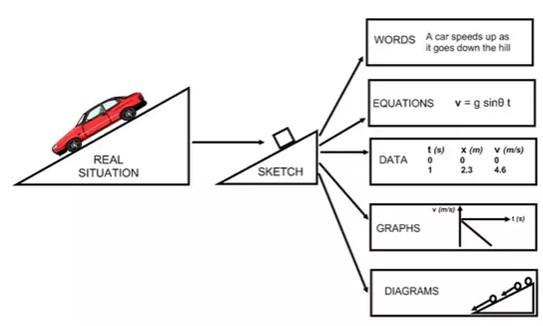
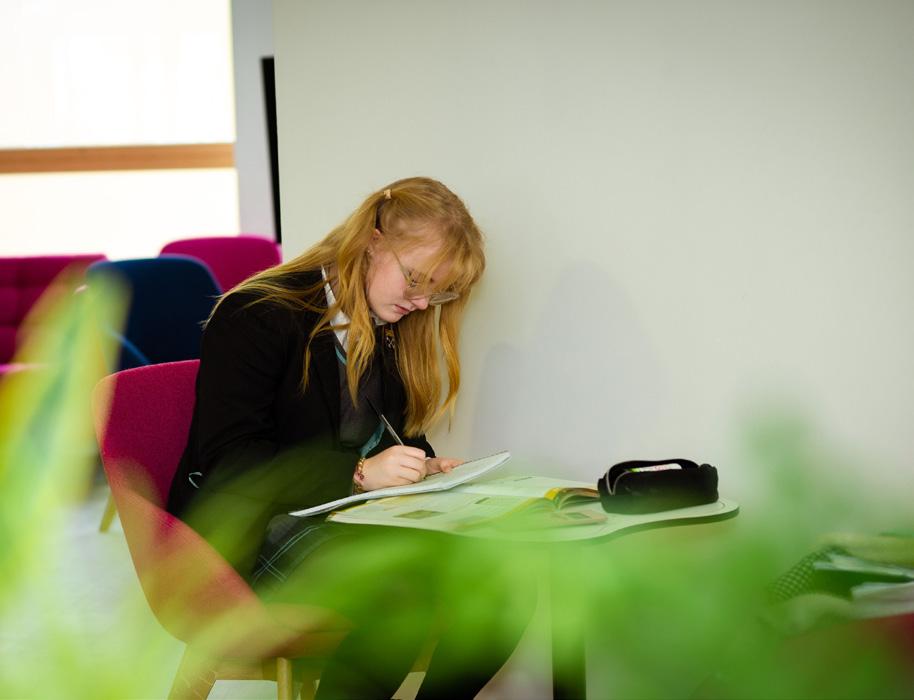

Do you enjoy:
Reading widely and independently?
Responding critically and creatively with literary texts and language?
Applying your knowledge of literary and linguistic devices to texts?

Exploring the contexts of the texts you are reading and evaluate critical interpretations?
English Literature is a challenging subject, but is an excellent preparation both for university and careers which demand reasoning, analysis and discussion. It is widely recognised by universities that the skills developed through the study of English Literature are among the most transferable.
University options
• English Literature
• Creative writing
• History
• History of Art
• Law
• Linguistics
Careers relating to English
• Teaching
• Journalism
• Publishing
• Law
• Human Resources
• Marketing & Public Relations
• Acting
Component One: Drama and poetry pre-1900
Shakespeare: Hamlet
Drama (pre-1900): A Doll’s House
Poetry (pre-1900): Rossetti’s Selected Poems
Component Two: Comparative and contextual study
Close reading in chosen topic area
American Literature 1880-1940
The Gothic Dystopia
Comparative and contextual study from chosen topic area
Component Three: Literature post-1900

Close reading or re-creative piece with commentary
Comparative essay
Learners are required to study three literary texts. The three texts must include one prose text, one poetry text and one drama text.

An enquiring mind and a passion for literature is essential
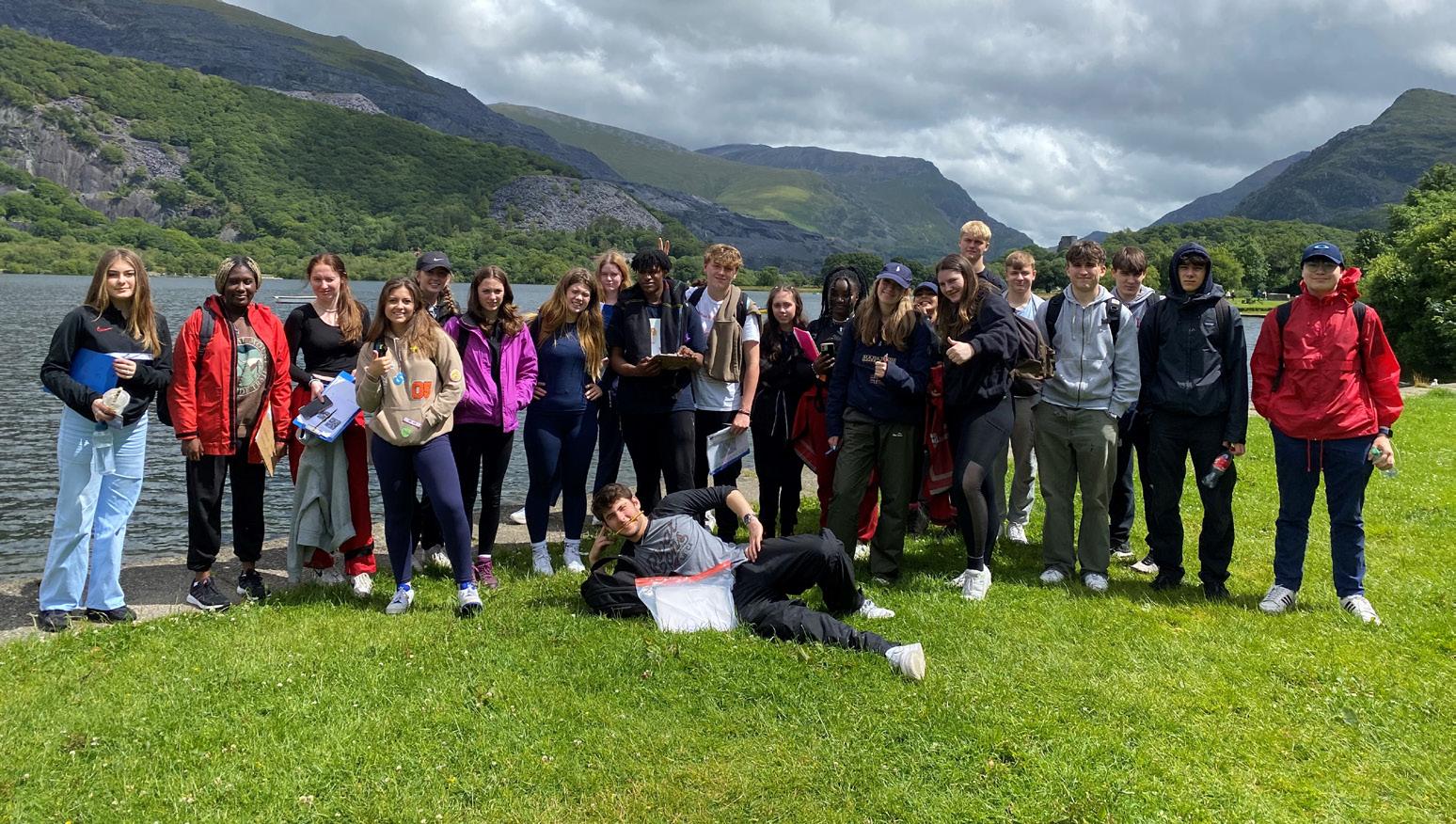
“Many of the world’s current problems boil down to geography, and need the geographers of the future to help us understand them.”
Michael Palin
“The study of Geography is… about understanding the complexity of our world”
Barack Obama
Geographers develop a multitude of skills. As a result, they are employed in a wide range of sectors in roles such as:
• Urban planner
• Climate policy advisor
• GIS consultant
• Business development manager
• Disaster response co-ordinator
• Corporate responsibility and sustainability manager
• Environmental consultant
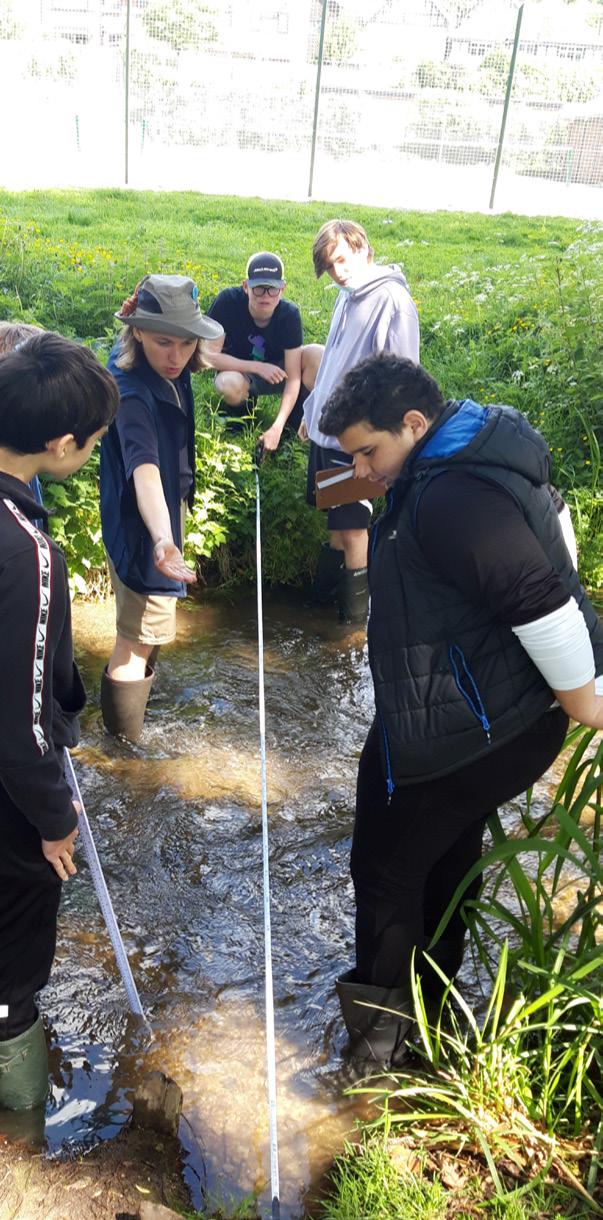
• Conservation projects manager
• Meteorologist
Paper One: Dynamic Landscapes (30%)



Tectonic Processes and Hazards

Glaciated Landscapes
The Water Cycle and Water Insecurity

The Carbon Cycle and Energy Security



















Paper Two: Dynamic Places (30%)
Globalisation
Regenerating Places
Superpowers
Health, human rights and intervention
Paper Three: Synoptic Investigation (20%)
A synoptic investigation of a place based issue
NEA: Independent Investigation (20%)
3000-4000 word coursework based on own investigation













Improve your knowledge and understanding of the past, make links with understanding the world today. Gain skills that are invaluable in many careers including: analysing, researching, communication and critical evaluation skills.
Learn how to assimilate academic texts and prioritise evidence.
Studying History can open a wide range of career choices to you, from journalism, politics and town planning to tourism and law. You could become a historian, work in a museum or teach history.

• Law
• Politics
• Business and Finance
• Education
• Public sector careers
• Academic research
• Conservation
• Heritage and Historic Buildings
• Museums and Galleries
• Journalism
Component 1
The Tudors 1485-1603

2.5 hour exam
40% weighting
Component 2
Russia: Revolution and Dictatorship 1917-53

2.5 hour exam
40% weighting
Component 3
Independent Historical Investigation
3500-4500 word essay
20% weighting
‘We are not makers of History. We are made by History.’
Martin Luther King
This A-Level course is designed to enable students to acquire critical, rational and cognitive understanding of religious, moral and philosophical thoughts which not only shaped ancient civilizations, but also currently underpin aspects of modern societies, globally. This would be achieved through rigorous explorations of ultimate and moral questions like:
What makes us human?
Is appearance the same as reality?
Are there limits to what we can know?
Is justice a virtue?
Is morality absolute or relative?
Is morality logically independent of religion?
What happens when we die?
Do near-death experiences (NDEs) authenticate claims about after-life?
Can religious experience be proven to be true?
Does God exist? And, can God be fully known?
Where can Religious Studies take me?
A Level Religious Studies is considered by Russell Group universities as one of the traditional (or preferred) subjects for entry into any Arts, Humanities and Social Science degrees, particulary those listed below. Upon graduation from university in any of these disciplines, there is a wide variety of career options.
University options
• Philosophy
• Law
• PPE
• Theology & Religious Studies
• Sociology
• Classics
• History
• English Literature
• Sociology and Anthropology
• History
Potential Careers
• Law
• Teaching
• Social work
• Charities & NGOs
• Marketing
• Research
• Banking
• Civil service
• Public relations
• Publishing
• Journalism
Paper One: Philosophy of Religion (33.3%)
Plato and Socrates
Soul, mind and body
The existence of God

Religious experience
Problem of evil
The nature of God
Religious language .
Paper Two: Religion and Ethics (33.3%)
Normative ethical theories
Applied Ethics
Business ethics
Sexual ethics
Euthanasia Conscience
Meta ethics .
Paper Three: Development in Religious Thoughts (33.3%)
Augustine on human nature
Death and afterlife
Knowledge of God’s existence
The Person of Jesus
Christian moral principles and actions

Religious pluralism
Gender, theology and society
Secularisation, Liberation theology and Marxism
Economics is the branch of knowledge concerned with the production, consumption, and transfer of wealth. Topics of study include:
• Supply and Demand
• Fiscal Policy
• Employment
• GDP
• Markets
• Division of Labour
• Monopoly Power
Economics is a great subject to study at university. You can study it in Single or Joint Honours. It works well as a Joint Honours Course, having links with a variety of disciplines such as Maths, Politics, International Relations, Development & Public Policy. The widely transferable analytical and problem-solving skills developed by economics students means that careers in economics are wide-ranging and diverse.
• Balance of payments Careers

University Courses
• Politics, Philosophy and Economics
• Economics and History
• Economics and Maths
• Development Economics
• Business and Management
• Accountancy
• Business
• Civil Service
• Consulting
• Finance
• Information Services
• Journalism
• Law and Legal Services
• Media
• Teaching and Lecturing
• Think Tanks
Micro Economics: The study of behaviour of individuals, households and firms in decision making, and the allocation of resources. How the individual component elements of the economy operate, the effect nd impact each has upon the other.


Macro Economics: The study of a country and how its policies affect the economy as a whole. The role of Monetary, Fiscal and Supply-Side policy decisions, the UK’s relationship both with Europe and other nations.
Final Exams: 3 x 2 hr papers of equal weighting 1 x Micro, 1 x Macro, 1 x Synoptic (Micro & Macro)
Year Linear Course split equally between Micro Economics and Macro EconomicsStudying Politics is to study the way in which communities organise themselves. A-level Politics is a social science course and good students will be able to write clear and analytical essays. Some of the topics covered include:
• Parliament
• Pressure Groups
• Election Systems
• Voting Behavior
• Human Rights
• Prime Minister
• The Judicary
• Globalisation
If you are fascinated by the world around you, why certain decisions are made and how we could attempt to make things better, then consider A Level Politics.
Where can Politics take me?
A Level Politics is an excellent base for a university degree in a wide range of fields, including those listed below, which can open up a variety of career opportunities across many different sectors.
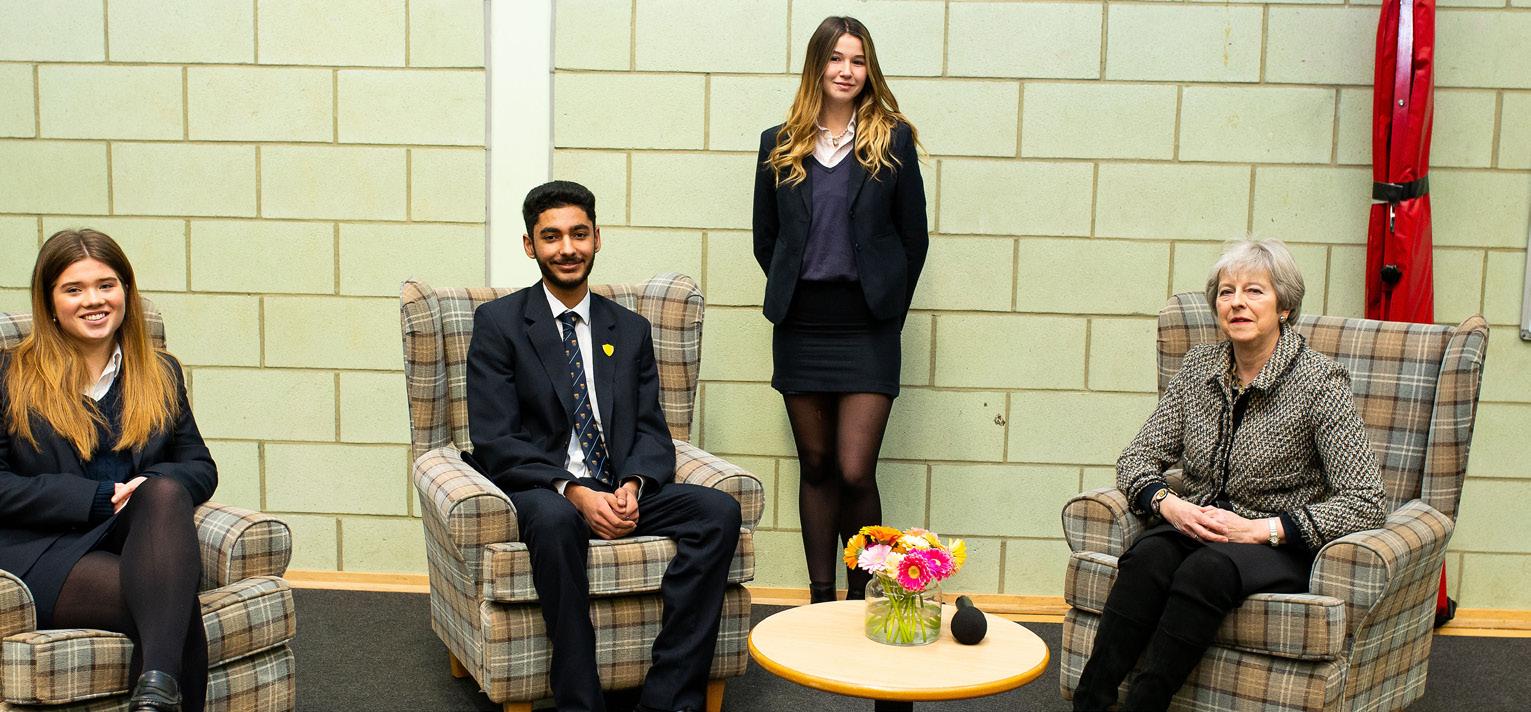
University Courses
• Politics
• Social Sciences
• History
• Economics
• Social Policy
• Human Rights
• International Relations
• Advertising
• Journalism
Careers
• Public Sector
• Education
• Charity Sector
• Human Rights
• Oil and Gas
• Law
• Front-line Politics
• Election Data Analysts
• Advocacy

Political Parties
Democracy Elections
Voting Behaviour
Socialism
Liberalism Conservatism .
Parliament Constitution
Judiciary

Relations between the branches
PM and Executive Feminism
IR theories
State and Globalisation
EU and Regionalism
Power
Global Governance
Political Economic Environmental Human Rights .
Literally defined, Psychology is the scientific study of the mind and how it dictates and influences our behaviour. It’s about understanding what makes people tick and how this understanding can help us address many of the problems and issues in society today.
Psychology functions as both a thriving academic discipline and a vital professional practice, one dedicated to the study of human behaviour - and the thoughts, feelings, and motivations behind it - through observation, measurement, and testing, in order to form conclusions that are based on sound scientific methodology.

Where can Psychology take me?
A Level Psychology is an excellent base for a university degree in a wide range of areas, such as those listed below. If you study Psychology to degree level then a variety of careers are open to you. Employers know that you have a willingness to work hard and the ability to think logically to solve problems.
University Courses
• Education
• Health and Medicine
• Sport and Exercise
• Neuropsychology
• Linguistics
• Forensics
• Counselling
• Business and Marketing
• Philosophy
Careers
• Psychologist
• Psychotherapist
• Social worker
• Counsellor
• Educational psychologist
• Human resources manager
• Teacher
• Research roles
• Media roles
Paper One: Introductory Topics in Psychology (33.3%)
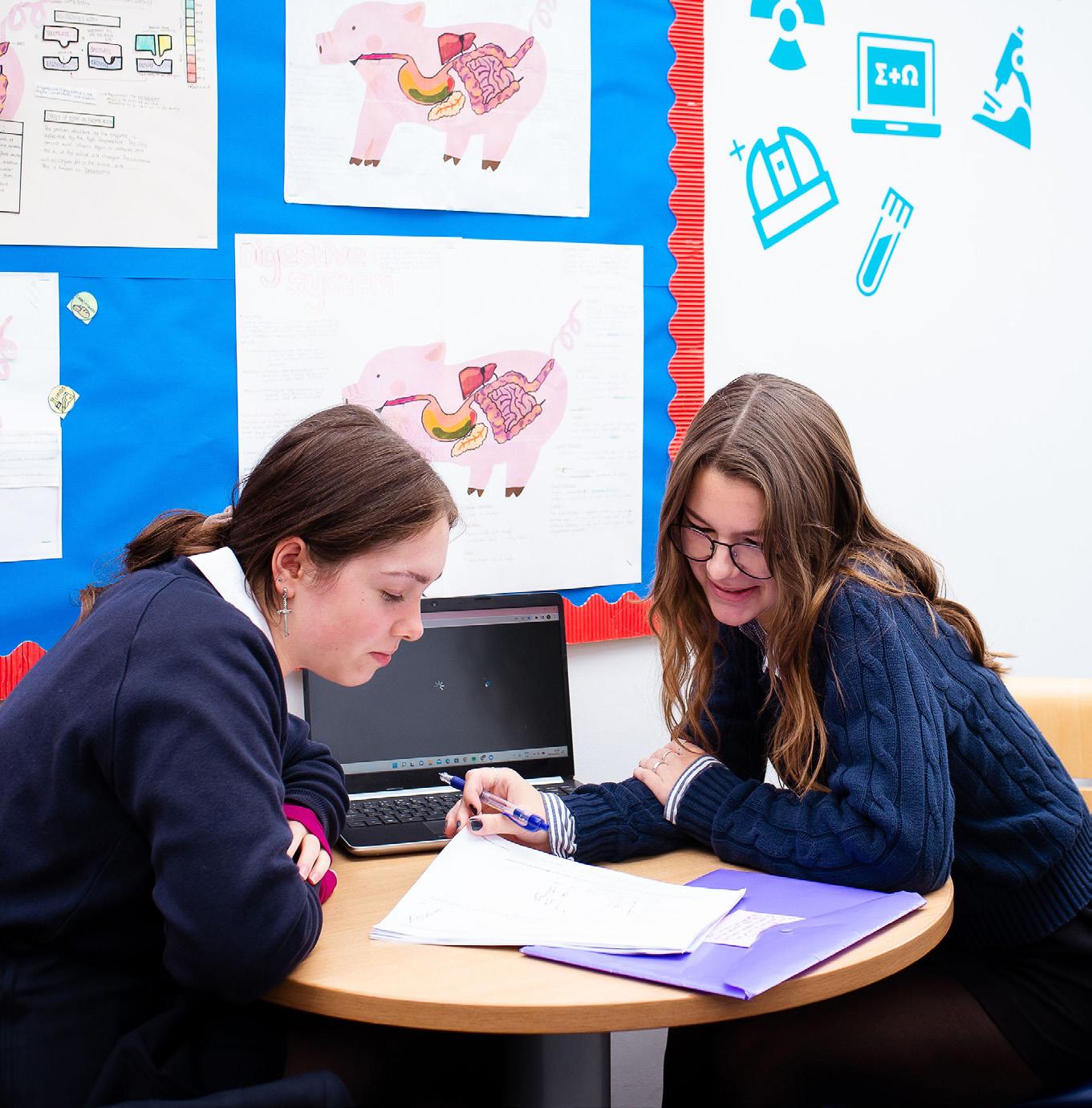
Two hour paper
• Social Influence
• Memory
• Attachment
• Psychopathology
Paper Two: Psychology in Context (33.3%)
Two hour paper
• Approaches in Psychology
• Biological Psychology
• Research Methods (double weighting)
Paper Three: Issues and Options in Psychology (33.3%)
Two hour paper
• Issues and Debates
• Relationships
• Schizophrenia
• Forensic Psychology
Chemistry is the study of matter … its structure, its bonding and how it behaves.
Chemistry starts at the dawn of time, with the formation of the chemical elements in the big bang and in stars. These elements, and the compounds they form, make up the materials from which the entire universe is made. Chemists study the properties of these substances, and use chemical reactions to produce new materials — metals, medicines, plastics, dyes, ceramics, fertilisers, fuels, explosives, and textiles.
Where can Chemistry take me?
The study of chemistry to degree level helps you develop logical thought and numerical skills and the ability to write accurate and concise reports. These skills will open doors to a wide variety of employment opportunities. The range of available jobs is considerable and covers many different types of chemistry across many different industries.

University Courses
• Chemistry
• Physics
• Maths
• Engineering
• Biology
• Environmental sciences
• Medicine
• Pharmacy
• Dentistry
• Biochemistry
Careers
• Analytical Chemist
• Chemical Engineer
• Dentist
• Doctor
• Lecturer / Teacher
• Environmental Chemist
• Forensic Scientist
• Patent Agent
• Pharmacist
• Toxicologist
Content is split into six teaching modules:
Module 1 – Development of practical skills in chemistry

Module 2 – Foundations in chemistry
Module 3 – Periodic table and energy
Module 4 – Core organic chemistry
Module 5 – Physical chemistry and transition elements
Module 6 – Organic chemistry and analysis

Component 01 (37%) 2 hours 15 minutes written paper
Periodic table, elements and physical chemistry
Assesses content from modules 1, 2, 3 and 5
Component 02 (37%) 2 hours 15 minutes written paper
Synthesis and analytical techniques
Assesses content from modules 1, 2, 4 and 6
Component 03 (26%) 1 hour 30 minutes written paper
Unified chemistry - Assesses content from all modules (1 to 6)
Component 04 (reported separately)
Practical Endorsement in Chemistry (non exam assessment)
The Practical Endorsement is a compulsory part of the course which is completed throughout the two years. It does not contribute to the students overall grade, but is reported separately.
Biology is the study of living organisms. It is divided into many specialised fields that cover the morphology, physiology, anatomy, behaviour, origin and interactions of species. Topics of study include:
• Biochemistry
• Ecology
• Evolution and classification
• Diseases
• Neuronal and Hormonal communication
• Genetics
• Manipulating Genomes
A-level Biology takes what you have learned at GCSE to the next level.
As with the other sciences, studying biology helps you to build up research, problem solving, organisation and analytical skills. Working on group projects as part of your studies will also help you build your teamwork and communication skills.
Biology is an excellent base for a university degree in a wide range of fields including:

• Veterinary
• Medicine
• Dentistry
• Sports science
• Biochemistry
• Forensics
A-Level Biology can open up a range of career opportunities in sectors such as:
• Biological research
• Environment
• Forensics
• Sports
• Science communication
• Medical industry
• Veterinary
• Zoology
Content is split into six teaching modules:
Module 1 – Development of practical skills in biology
Module 2 – Foundations in biology
Module 3 – Exchange and transport
Module 4 – Biodiversity, evolution and disease
Module 5 – Communication, homeostasis and energy
Module 6 – Genetics, evolution and ecosystems
The course includes a residential Biology trip, in the summer term of Lower Sixth. On the trip content from module 4 and 6 are taught, along with a number of the compulsory practical investigations and key numeracy skills.

Component 01 (37%) 2 hours 15 minutes written paper
Biological Processes - Assesses content from modules 1, 2, 3 and 5

Component 02 (37%) 2 hours 15 minutes written paper
Biological Diversity - Assesses content from modules 1, 2, 4 and 6
Component 03 (26%) 1 hour 30 minutes written paper
Unified Biology - Assesses content from all modules (1 to 6)
Component 04 (reported separately)
Practical Endorsement in Biology (non exam assessment)
The Practical Endorsement is a compulsory part of the course which is completed throughout the two years. It does not contribute to the students overall grade, but is reported separately.
Physics is a natural science that involves the study of matter and its motion through space and time, along with related concepts such as energy and force. It is the study of nature in an attempt to understand how the universe behaves. Physics is the study of the interactions of matter, energy and the interactions between the two.

If you are fascinated by the world around you, the mechanisms behind its structure and the principles by which it works, then A Level Physics is for you!
A-level Physics takes what you have learned at GCSE to the next level.
A Level Physics will give you strong analytical and research skills. You will learn to approach and solve problems in a methodical and logical way. These skills are highly valued by both universities and employers.
Physics is an excellent base for a university degree in a wide range of fields including:
• Mathematics
• Physics
• Engineering
• AI
• Physics
• Robotics
A-Level Physics can open up a range of career opportunities in sectors such as:
• Aerospace & Defence
• Education
• Renewable Energy
• Engineering
• Oil and Gas
• Instrumentation
• Manufacturing
• Meteorology and Climate Change
• Nanotechnology
• Medicine and Health
• Science
• Telecommunications

Content is split into six teaching modules:
Module 1 – Development of practical skills in physics
Module 2 – Foundations of physics
Module 3 – Forces and motion
Module 4 – Electrons, waves and photons
Module 5 – Newtonian world and astrophysics

Module 6 – Particles and medical physics
Component 01 (37%) 2 hours 15 minutes written paper
Modelling Physics - Assesses content from modules 1, 2, 3 and 5
Component 02 (37%) 2 hours 15 minutes written paper
Exploring Physics - Assesses content from modules 1, 2, 4 and 6
Component 03 (26%) 1 hour 30 minutes written paper
Unified Physics - Assesses content from all modules (1 to 6)
Component 04 (reported separately)
Practical Endorsement in Physics (non exam assessment)
The Practical Endorsement is a compulsory part of the course which is completed throughout the two years. It does not contribute to the students overall grade, but is reported separately.
The Practical Endorsement requires a minimum of 12 practical activities to be completed from the Practical Activity Groups (PAGs) defined below
Computer Science is a practical subject where students can apply the academic principles learned in the classroom to real-world systems. It’s an intensely creative subject that combines invention and excitement, that can look at the natural world through a digital prism.

Computer Science values computational thinking, helping students to develop the skills to solve problems, design systems and understand the power and limits of human and machine intelligence.
A good grade in A Level Computer Science is valued by Universities and lays an appropriate foundation for further study in:
• Computer Science
• Engineering
• Physics or related subjects in higher education
Computer Science at A level is also valued by employers since it requires the development of analytical thinking and problem solving skills.
Many problems in the Sciences, Engineering, Healthcare, Business and other areas can be solved effectively with computers, but finding a solution requires both computer science expertise and knowledge of the particular application domain. Thus, computer scientists often become proficient in other subjects.
Component 1: Computer Systems (40%)
• Processors
• Input/Output/Storage Devices
• Software & Software Development


• Exchanging Data
• Data Types, Data Structures
• Legal, Moral and Ethical issues
Component 2: Algorithms and Processing (40%)
• Elements of Computational Thinking
• Problem Solving and Programming
• Algorithms to solve problems and standard Algorithms
Component 3: Programming Project (20%)
Choice of a computing problem to work through according to guidance in specification:
• Analysis of Problem
• Design of the Solution
• Developing the Solution
• Evaluation
“One language sets you in a corridor for life. Two languages open every door along the way.”
Frank SmithA-level French takes what you have learned at GCSE to the next level and includes the study of France and French-speaking countries. Topics of study include:
• La famille en voie de changement
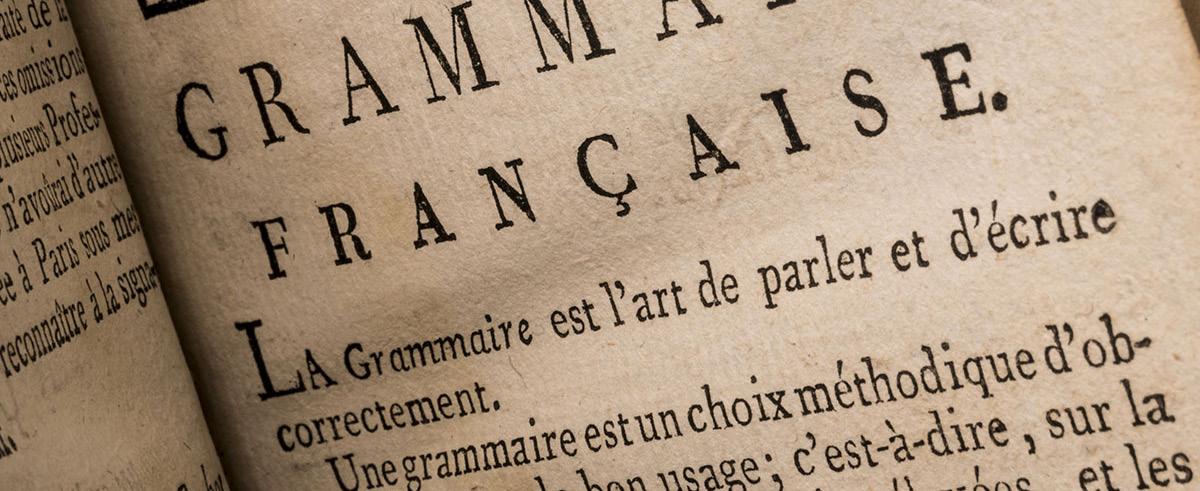
• La cyber-société
• Les aspects positifs d’une société diverse
The ability to speak more than one language and knowledge of different cultures can be very useful in many job sectors.
A Level French is an excellent base for a university degree in a range of fields including:
• French with another language
• French and History
• French and Business
• Linguistics
• French A-level also opens up possibilities of studying/ working abroad as part of a joint honours course.
Key areas of employment include:
• Translation and interpreting
• Education
• Tourism
• Media
• Journalism
• Hospitality
Why study French? Where can French take me?What’s assessed?
Aspects of French-speaking society: current trends
Aspects of French-speaking society: current issues
Artistic culture in the French-speaking world


Aspects of political life in the French-speaking world
Grammar
What’s assessed?
One French text (‘L’étranger’) and a French film (La Haine)
Grammar
What’s assessed?
Individual research project
One of four themes:
Aspects of French-speaking society: current trends, Aspects of French-speaking society: current issues, Artistic culture in the French-speaking world, Aspects of political life in the French-speaking world
How it’s assessed
Written exam: 2 hours 30 minutes
100 marks
50% of A-level
How it’s assessed
Written exam: 2 hours
80 marks in total
20% of A-level
How it’s assessed
Oral exam: 21–23 minutes
(including 5 minutes preparation time)
60 marks in total
30% of A-level
“One language sets you in a corridor for life. Two languages open every door along the way.”
Frank SmithA-level Spanish takes what you have learned at GCSE to the next level and includes the study of Spain and Spanish-speaking coun-tries. Topics of study include:

• Los cambios en la familia
• El ciberespacio
• La inmigración
• La influencia de los ídolos
• La identidad regional
The ability to speak more than one language and knowledge of different cultures can be very useful in many job sectors.
A Level Spanish is an excellent base for a university degree in a range of fields including:
• Spanish with another language
• Spanish and History
• Spanish and Business
• Linguistics
• Spanish A-level also opens up possibilities of studying/ working abroad as part of a joint honours course.
Key areas of employment include:
• Translation and interpreting
• Education
• Tourism
• Media
• Journalism
• Hospitality
What’s assessed?
Aspects of Hispanic society
Artistic culture in the Hispanic world
Multiculturalism in Hispanic society
Aspects of political life in Hispanic society
Grammar
What’s assessed?
One Spanish text (Como Agua Para Chocolate) and a Spanish film (María, Llena Eres de Gracia)
Grammar
What’s assessed?
Individual research project
One of four themes:
Aspects of Hispanic society
Artistic culture in the Hispanic world
Multiculturalism in Hispanic society
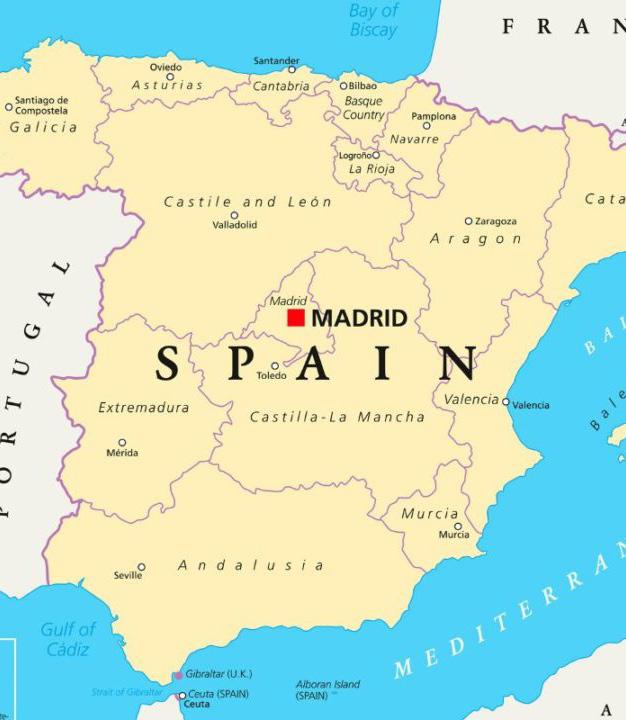
Aspects of political life in Hispanic society
How it’s assessed
Written exam: 2 hours 30 minutes
100 marks
50% of A-level
How it’s assessed
Written exam: 2 hours
80 marks in total
20% of A-level
How it’s assessed
Oral exam: 21–23 minutes
(including 5 minutes preparation time)
60 marks in total
30% of A-level
Latin A Level is a challenging but ultimately rewarding subject to pursue. Not only does Latin form the basis of many European languages, it also brings students into contact with some of the greatest historians, generals, poets and orators the world has ever seen.
Topics of study include:
• Poetry from the age of Augustus
• The history of Rome as told by Livy
• Composing stories in Latin
Beyond the linguistic benefits, students can read what the Romans had to say about themselves, from the bragging of Julius Caesar to the propaganda of sections of the Aeneid, or the wit of Ovid and rhetorical fireworks of Cicero. Trips to plays, museums and sites contribute to the broader understanding of the cultural as well as linguistic legacy of the Romans.
Candidates should have achieved at least a Grade 7 in GCSE Latin to consider taking the subject for A level. In addition, it is recommended that learners have attained communication and literacy skills at a level equivalent to at least a GCSE Grade 7 in English.
The range of Classical degree subjects is considerable and many top universities now run Classical Studies, a contin-uation of the non-linguistic aspect, alongside traditional Classics degrees requiring Classical languages (most also now offer the opportunity to learn the languages from scratch.)
A Classics degree provides skills relevant to a wide range of sectors, including:
• Legal
• Media and broadcasting
• Film and television
• Banking
• Consultancy
• Marketing
• Museum and gallery work
Component 01: Unseen translation
Students build their knowledge of the Latin language to become familiar with the vocabulary and linguistic structures used by Livy and Ovid (both hexameters and elegiacs).

Component 02: Prose composition or comprehension
Students develop and demonstrate their detailed understanding of Latin vocabulary and linguistic structures through either: Translating unseen material from English into Latin; or Demonstrating their understanding of an unseen prose text through comprehension, translation and questions on syntax and accidence.

Component 03: Prose literature
Students study two prose set texts.. Students also study additional literature in translation so that they understand the context from which the set texts have been taken.
Component 04: Verse literature
Students study two verse set texts. Students also study additional literature in translation so that they understand the context from which the set texts have been taken.
Studying Art improves student’s development both academically and on a personal level. It helps us to decode and understand others and the visual world around us. Art is an unusual subject with less boundaries as to what is right or wrong.
An awareness of our heritage and history can be documented through art. Our ancestors drew images and symbols on surfaces as a way of communication using symbols. Art allowed us to capture images well before photography was invented.
Art documents the development of a person, reflecting the memories, thought and feelings felt not only at the time but on a much larger scale - documenting it for future generations.
Complex and subtle forms of thinking are developed when pupils work on creating their own images, as well as time management and organisational skills.
Lateral thinking and problem solving skills and an understanding and appreciation of different cultures are also gained by studying A Level Art. Students become critically aware of their own creations. This creates selfindependent and autonomous learners who are critically aware of their intentions.

Potential Careers
• Graphic Designer
• Architect
• Fine Artist
• Illustrator
• Animator
• Web Designer
Why study Art? Where can Art take me?A portfolio of practical work showing their personal response to either a starting point, brief, scenario or stimulus, devised and provided by the learner or centre. And a related study: an extended response of a guided minimum of 1000 words .
The early release paper will be issued to teachers on 1st February in Year 13 and will provide learners with a number of themes, each with a range of written and visual starting points, briefs and stimuli. Students will have a period of time to develop sketchbooks and undertake research before concluding this project with a 15 hour exam, taken over several days.
A01 Develop ideas through sustained and focused investigations informed by contextual and other sources, demonstrating analytical and critical understanding.

A02 Explore and select appropriate resources, media, materials, techniques and processes, reviewing and refining ideas as work develops.
A03 Record ideas, observations and insights relevant to intentions, reflecting critically on work and progress.
A04 Present a personal and meaningful response that realises intentions and, where appropriate make connections between visual and other elements.
Why study P.E.?
The Sports Industry is Booming!
• Supporting over 450,000 jobs in the UK,
• £20bn industry in the UK
• Experts believe this is just the beginning as more money flows into the fast growing sector.
Is this course for you?
Do you have genuine interest in the theoretical concepts in PE?
Want to study sport or sports related degree?
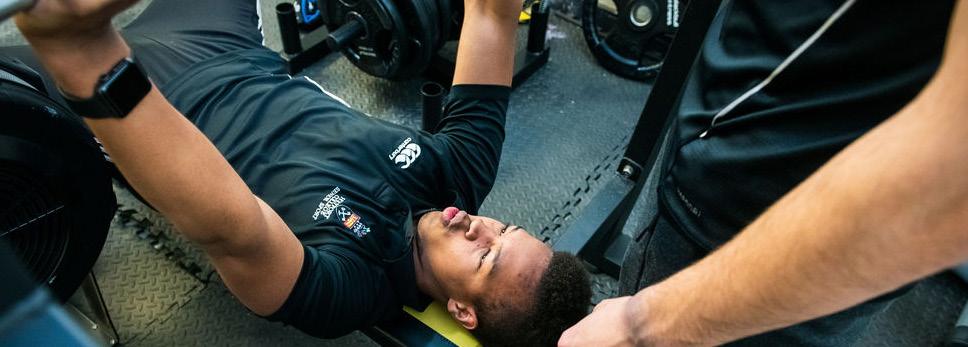
Are you interested in the science of the body?
Do you want to be a coach or teacher?
Have you enjoyed GCSE PE and want to take it further?
Where can P.E. take me?
Degree Options
• Physical Education and Sport
• Sports Science
• Sports Rehabilitation
• Sports Management
• Sport and Exercise Psychology
• Sports and Exercise Therapy
• Sport and Exercise Nutrition
• Adventure and Outdoor Management
• Athletics Development and Peak Performance
• Fitness Management
• Coach Education
Future Career Paths
• Sports Marketing
• Physiotherapy
• Data Analyst
• Sports journalist
• Sports Management
• Sports Medicine
• Physical Education Teacher
• Occupational Therapist
• Athletic Trainer
• Fitness Specialist
• Personal Trainer
Component 01: Physiological factors affecting performance
2 hour written paper. 90 marks. 30% of total A Level.
• Applied anatomy and physiology
• Exercise physiology
• Biomechanics.
Component 02: Psychological factors affecting performance
1 hour written paper. 60 marks. 20% of total A Level.
• Skill acquisition
• Sports psychology.
Component 03: Socio-cultural issues in physical activity and sport

1 hour written paper. 60 marks. 20% of total A Level.
• Sport and society
• Contemporary issues in physical activity and sport.
Component 04: Performace in Physical Education
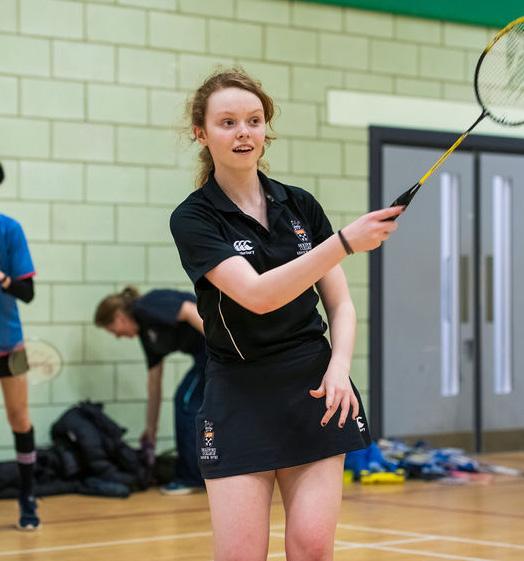
Non-exam assessment (NEA). 60 marks. 30% of total A Level.
• Performance or coaching
• Evaluation and Analysis of Performance for Improvement (EAPI).
This is a Level 3 qualification that provides students with the opportunity to research and write a dissertation, carry out a scientific investigation, work on a performance (eg music, drama, sport) or design an artefact (eg painting, sculpture, website, graphic design). Students will learn valuable skills for university such as how to write an abstract, how to construct a literature review and Harvard referencing as well as the opportunity to develop critical, reflective, problem-solving and independent learning skills. Students independently select their title and, throughout the course of approximately 8 months, they plan, research and evaluation their project guided by a teacher who acts as a mentor for the entire process.

Key facts:
• An A* in EPQ equals 28 UCAS points or half an A level
• Teaches students to Manage (A01), Use Resources (A02), Develop & Realise (A03) & Review (A04)
• Recognised by an increasing number of Universities and can result in a lower entry offer for University
• Provides key life skills both for Further Education and in preparing students for life
• Last year, 43 students completed an EPQ at Holyport College with 40 students achieving either and A or A* grade
• 35% of the university offers received by Holyport College students last year we reduced offers due to the EPQ
The level 3 certificate in Core Maths is a course designed for students who require a certain level of mathematical literacy for their chosen subject at university level.
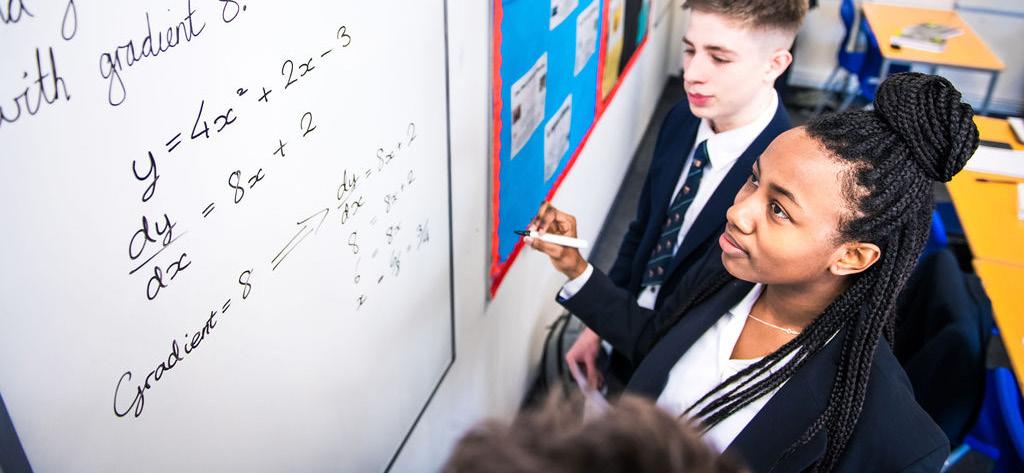
It is intended for learners taking Level 3 courses, for whom GCE A level Mathematics is not appropriate or learners who need support with mathematics for Level 3 or HE courses: for example, in Business, Biology, Chemistry, Computing, Economics, Geography, ICT, Psychology, Sociology or Health & Social Care.
The content of core maths is directed towards areas of mathematics directly related to data analysis, finances, statistical modelling and decision making.
A typical course would include the following modules:
• Modelling
• Statistics
• Finance
• Working with exponentials
• Working with graphs and gradients
• Geometry and measures
• Risk
• Estimation
• Problem solving
• Communicating solutions
Full information on courses, the application process and key dates is available on our website: www.holyportcollege.org.uk/sixth-form

For further information please contact: 6thformadmissions@holyportcollege.org.uk
Holyport College
Ascot Road
Holyport, Berkshire SL6 3LE